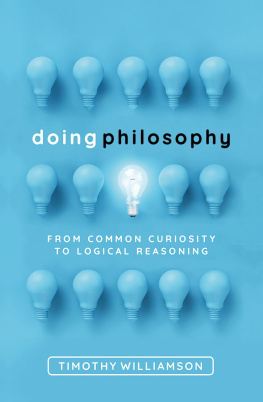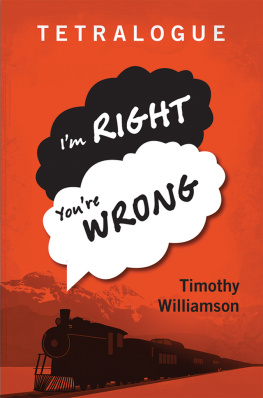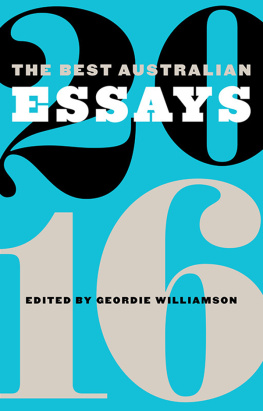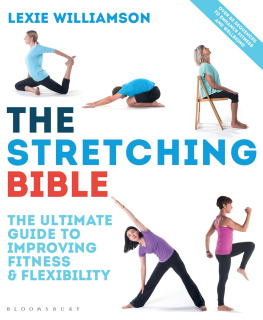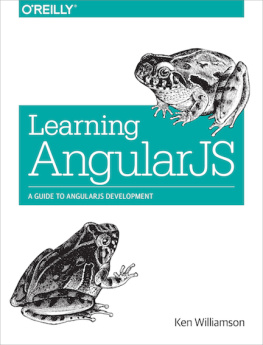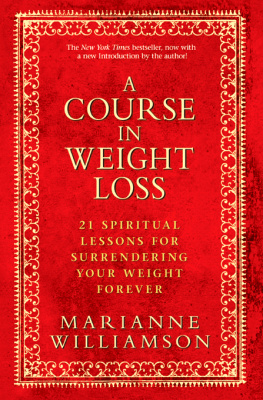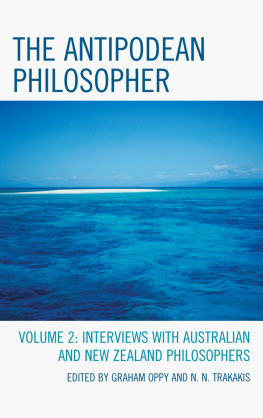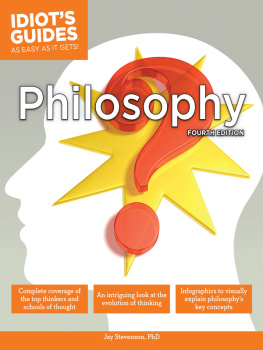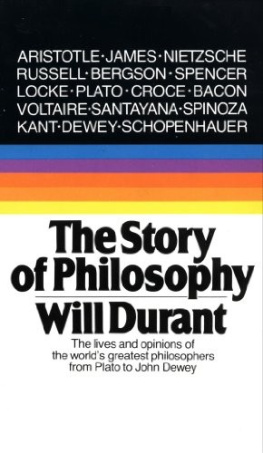WILLIAMSON - DOING PHILOSOPHY: how philosophers think
Here you can read online WILLIAMSON - DOING PHILOSOPHY: how philosophers think full text of the book (entire story) in english for free. Download pdf and epub, get meaning, cover and reviews about this ebook. year: 2018, publisher: Oxford University Press, Incorporated, genre: Religion. Description of the work, (preface) as well as reviews are available. Best literature library LitArk.com created for fans of good reading and offers a wide selection of genres:
Romance novel
Science fiction
Adventure
Detective
Science
History
Home and family
Prose
Art
Politics
Computer
Non-fiction
Religion
Business
Children
Humor
Choose a favorite category and find really read worthwhile books. Enjoy immersion in the world of imagination, feel the emotions of the characters or learn something new for yourself, make an fascinating discovery.
- Book:DOING PHILOSOPHY: how philosophers think
- Author:
- Publisher:Oxford University Press, Incorporated
- Genre:
- Year:2018
- Rating:3 / 5
- Favourites:Add to favourites
- Your mark:
- 60
- 1
- 2
- 3
- 4
- 5
DOING PHILOSOPHY: how philosophers think: summary, description and annotation
We offer to read an annotation, description, summary or preface (depends on what the author of the book "DOING PHILOSOPHY: how philosophers think" wrote himself). If you haven't found the necessary information about the book — write in the comments, we will try to find it.
DOING PHILOSOPHY: how philosophers think — read online for free the complete book (whole text) full work
Below is the text of the book, divided by pages. System saving the place of the last page read, allows you to conveniently read the book "DOING PHILOSOPHY: how philosophers think" online for free, without having to search again every time where you left off. Put a bookmark, and you can go to the page where you finished reading at any time.
Font size:
Interval:
Bookmark:


Great Clarendon Street, Oxford, OX2 6DP, United Kingdom
Oxford University Press is a department of the University of Oxford. It furthers the University's objective of excellence in research, scholarship, and education by publishing worldwide. Oxford is a registered trade mark of Oxford University Press in the UK and in certain other countries
Timothy Williamson 2018
The moral rights of the authors have been asserted
First Edition published in 2018
Impression: 1
All rights reserved. No part of this publication may be reproduced, stored in a retrieval system, or transmitted, in any form or by any means, without the prior permission in writing of Oxford University Press, or as expressly permitted by law, by licence or under terms agreed with the appropriate reprographics rights organization. Enquiries concerning reproduction outside the scope of the above should be sent to the Rights Department, Oxford University Press, at the address above
You must not circulate this work in any other form and you must impose this same condition on any acquirer
Published in the United States of America by Oxford University Press 198 Madison Avenue, New York, NY 10016, United States of America
British Library Cataloguing in Publication Data
Data available
Library of Congress Control Number: 2017962349
ISBN 9780198822516
ebook ISBN 9780192555465
Printed in Great Britain by Clays Ltd, St Ives plc
Links to third party websites are provided by Oxford in good faith and for information only. Oxford disclaims any responsibility for the materials contained in any third party website referenced in this work.
I owe many thanks to the people who have helped in the development of this book at various stages with their perceptive comments: Jennifer Nagel, Peter Momtchiloff, Andrea Keegan, and Jenny Nuge at Oxford University Press; the anonymous referees; above all, my wife Ana Mladenovi Williamson.
In a few places, I have put more technical details of an idea in a display box. Some readers will find them helpful, but they can be skipped without breaking the flow of the main argument.
Jean-Pierre Rives is a rugby union legend. Livewire captain of the great French team in the years 197884, he was an unforgettably dashing figure on the field with long, wild, blond hair and often a bloodstained shirt. In a newspaper interview, he explained his thinking about tactics. The key, he said, is to have a clear and distinct idea of what you are trying to achieve. Then you should break each complicated move down into its simplest components, make them intuitive, and build it back up from there. Without naming the iconic French philosopher Ren Descartes (15961650), Rives was following both his signature emphasis on the need for clear and distinct ideas and one of his Rules for the Direction of the Mind (rule 5). French schools teach philosophy, and it has unexpected uses.
Philosophy also has dangers. Rives did not recommend another part of Descartes method, his radical strategy of doubting whatever he could, including the whole world outside his mind, in order to rebuild science on the firm foundation of the few remaining certainties. Extreme doubt may not yield sporting success. Anyway, Descartes did not live up to his own high standards. He relied on dodgy old ways of thinking to prove Gods existence and then used God to resolve his doubts. Even at the time, many philosophers found his solution unconvincing. His reasons for doubt were like Frankensteins monster, which he constructed but could not control. That is the problem of scepticism. Its often dismissed as a non-issue, of interest only to paranoid philosophers. But dont forget the public relations consultants called in by politicians and businesses to undermine inconvenient scientific discoveries, like global warming and the harmful effects of smoking. Those consultants have a slogan: Our product is doubt. They know they cant prove the scientists wrong. Their aim is just to create enough confusion, to make people think The experts cant agree, so theres no point worrying. Climate change scepticism isnt a harmless philosophical eccentricity; its a threat to future generations.
Descartes starting point for reconstructing knowledge was his knowledge of his own inner thought. That too still has strange echoes. In March 2003 the United States under President George W. Bush and the United Kingdom under Prime Minister Tony Blair invaded Iraq and overthrew Saddam Husseins regime, claiming that it had weapons of mass destruction (WMD). The claim soon turned out to be false. In a 2004 speech defending his actions, Tony Blair said: I only know what I believe. He hadnt known that there were WMD, but he had known that he believed that there were WMD. He tried to divert attention away from the question of testable evidence out there for WMD to the question of his inner sincerity.
Philosophy also plays a role when we recognize that the people of that region have endured a long history of human rights abuses. We can do so because we have an idea of human rights. Philosophers played a key role in developing that idea: notably, in the same period as Descartes, Hugo Grotius (15831645), John Locke (16321704), and others.
Philosophy isnt something totally alien to us; its there already in our lives, in trivial ways and important ones. But what is philosophy? What are philosophers trying to achieve?
Traditionally, philosophers have wanted to understand the nature of everything, in a very general way: existence and non-existence, possibility and necessity; the world of common sense, the world of natural science, the world of mathematics; parts and wholes, space and time, cause and effect, mind and matter. They want to understand our understanding itself: knowledge and ignorance, belief and doubt, appearance and reality, truth and falsity, thought and language, reason and emotion. They want to understand and judge what we do with that understanding: action and intention, means and ends, good and bad, right and wrong, fact and value, pleasure and pain, beauty and ugliness, life and death, and more. Philosophy is hyper-ambitious.
That brief description raises an obvious question: since scientists study many of those topics, how is philosophy related to science? They were not always separate. From the ancient Greeks on, philosophy included natural philosophy, the study of the natural world. To cut a long story short, through the sixteenth and seventeenth centuries, natural philosophy turned into something recognizable as natural science in the modern sense, especially physics. Pioneers such as Galileo and Newton still described themselves as natural philosophers. Some philosophers were also scientists and mathematicians, including Descartes and Gottfried Wilhelm Leibniz (16461716). But natural philosophy or natural science developed a distinctive methodology, with a key role for experimentation, exact observation using special instruments such as telescopes and microscopes, measurement, and calculation. Increasingly, this child of philosophy has looked like a rival and mortal threat to its parent. For philosophy and natural science seem to be in competition to answer the same questions about the underlying nature of reality. If it is a duel, philosophy seems to be outgunned, for it only has thought, while natural science has those other methods too. If philosophers insist that they are better at thinking than natural scientists, who will believe them? To change the metaphor, the philosopher is cast in the role of the lazy man lecturing us from the comfort of his armchair about how the universe must be, while the scientist goes out to look and see how it really is. If thats right, isnt philosophy obsolete? Thus the rise of modern natural science has provoked a slow-burning crisis of philosophical method.
Font size:
Interval:
Bookmark:
Similar books «DOING PHILOSOPHY: how philosophers think»
Look at similar books to DOING PHILOSOPHY: how philosophers think. We have selected literature similar in name and meaning in the hope of providing readers with more options to find new, interesting, not yet read works.
Discussion, reviews of the book DOING PHILOSOPHY: how philosophers think and just readers' own opinions. Leave your comments, write what you think about the work, its meaning or the main characters. Specify what exactly you liked and what you didn't like, and why you think so.

